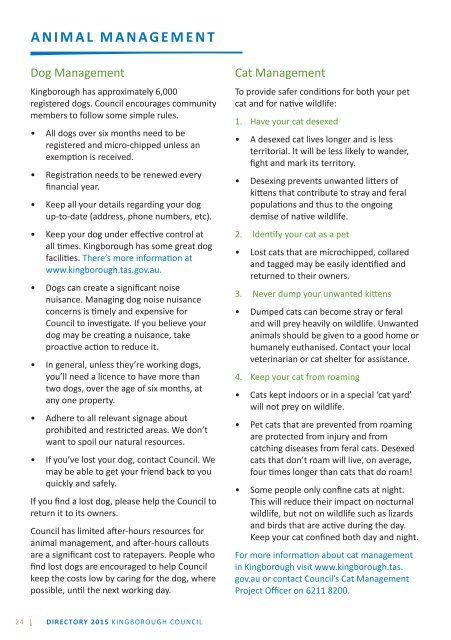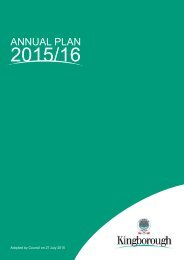KINGBOROUGH COUNCIL
Kingborough Council Directory 2015
Kingborough Council Directory 2015
You also want an ePaper? Increase the reach of your titles
YUMPU automatically turns print PDFs into web optimized ePapers that Google loves.
ANIMAL MANAGEMENT<br />
Dog Management<br />
Kingborough has approximately 6,000<br />
registered dogs. Council encourages community<br />
members to follow some simple rules.<br />
• All dogs over six months need to be<br />
registered and micro-chipped unless an<br />
exemption is received.<br />
• Registration needs to be renewed every<br />
financial year.<br />
• Keep all your details regarding your dog<br />
up-to-date (address, phone numbers, etc).<br />
• Keep your dog under effective control at<br />
all times. Kingborough has some great dog<br />
facilities. There’s more information at<br />
www.kingborough.tas.gov.au.<br />
• Dogs can create a significant noise<br />
nuisance. Managing dog noise nuisance<br />
concerns is timely and expensive for<br />
Council to investigate. If you believe your<br />
dog may be creating a nuisance, take<br />
proactive action to reduce it.<br />
• In general, unless they’re working dogs,<br />
you’ll need a licence to have more than<br />
two dogs, over the age of six months, at<br />
any one property.<br />
• Adhere to all relevant signage about<br />
prohibited and restricted areas. We don’t<br />
want to spoil our natural resources.<br />
• If you’ve lost your dog, contact Council. We<br />
may be able to get your friend back to you<br />
quickly and safely.<br />
If you find a lost dog, please help the Council to<br />
return it to its owners.<br />
Council has limited after-hours resources for<br />
animal management, and after-hours callouts<br />
are a significant cost to ratepayers. People who<br />
find lost dogs are encouraged to help Council<br />
keep the costs low by caring for the dog, where<br />
possible, until the next working day.<br />
Cat Management<br />
To provide safer conditions for both your pet<br />
cat and for native wildlife:<br />
1. Have your cat desexed<br />
• A desexed cat lives longer and is less<br />
territorial. It will be less likely to wander,<br />
fight and mark its territory.<br />
• Desexing prevents unwanted litters of<br />
kittens that contribute to stray and feral<br />
populations and thus to the ongoing<br />
demise of native wildlife.<br />
2. Identify your cat as a pet<br />
• Lost cats that are microchipped, collared<br />
and tagged may be easily identified and<br />
returned to their owners.<br />
3. Never dump your unwanted kittens<br />
• Dumped cats can become stray or feral<br />
and will prey heavily on wildlife. Unwanted<br />
animals should be given to a good home or<br />
humanely euthanised. Contact your local<br />
veterinarian or cat shelter for assistance.<br />
4. Keep your cat from roaming<br />
• Cats kept indoors or in a special ‘cat yard’<br />
will not prey on wildlife.<br />
• Pet cats that are prevented from roaming<br />
are protected from injury and from<br />
catching diseases from feral cats. Desexed<br />
cats that don’t roam will live, on average,<br />
four times longer than cats that do roam!<br />
• Some people only confine cats at night.<br />
This will reduce their impact on nocturnal<br />
wildlife, but not on wildlife such as lizards<br />
and birds that are active during the day.<br />
Keep your cat confined both day and night.<br />
For more information about cat management<br />
in Kingborough visit www.kingborough.tas.<br />
gov.au or contact Council’s Cat Management<br />
Project Officer on 6211 8200.<br />
24 DIRECTORY 2015 <strong>KINGBOROUGH</strong> <strong>COUNCIL</strong>




